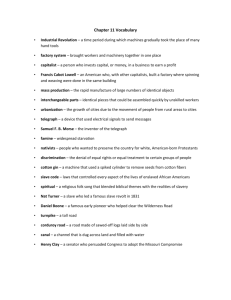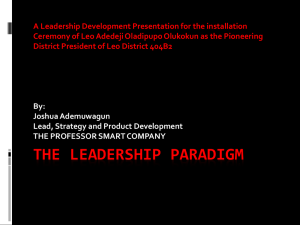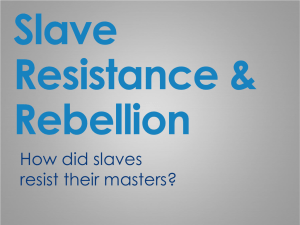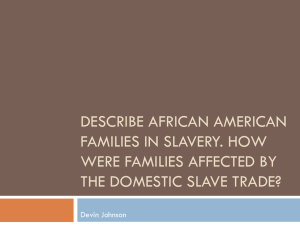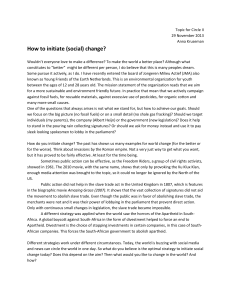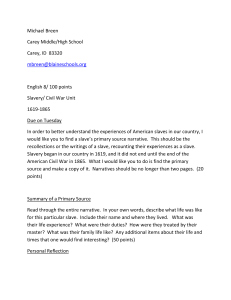The Dynamic Gospel
advertisement
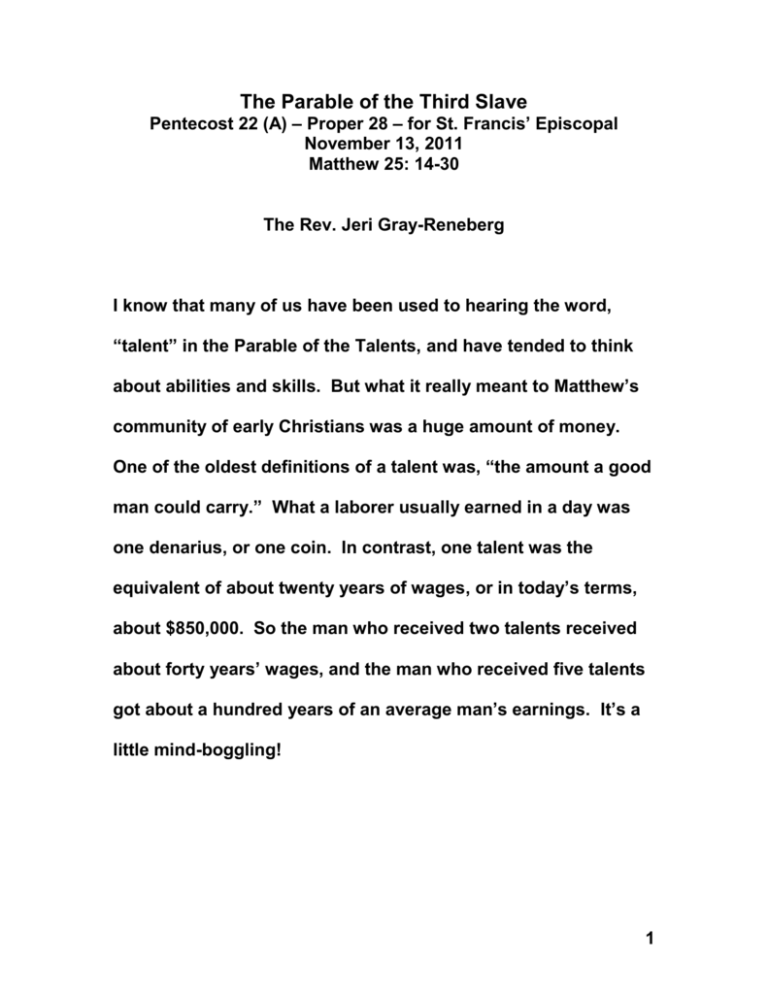
The Parable of the Third Slave Pentecost 22 (A) – Proper 28 – for St. Francis’ Episcopal November 13, 2011 Matthew 25: 14-30 The Rev. Jeri Gray-Reneberg I know that many of us have been used to hearing the word, “talent” in the Parable of the Talents, and have tended to think about abilities and skills. But what it really meant to Matthew’s community of early Christians was a huge amount of money. One of the oldest definitions of a talent was, “the amount a good man could carry.” What a laborer usually earned in a day was one denarius, or one coin. In contrast, one talent was the equivalent of about twenty years of wages, or in today’s terms, about $850,000. So the man who received two talents received about forty years’ wages, and the man who received five talents got about a hundred years of an average man’s earnings. It’s a little mind-boggling! 1 When we understand a little of the background, the third slave in Jesus’ parable of the talents doesn’t seem all that unreasonable. There was a lot of money at stake – after all, even one talent was more money than many people saw in a lifetime. According to Biblical scholars, it was a prudent thing to do to bury your money in the ground, and the rabbis would agree. It was unlikely to be stolen, and at least it would be safe. He probably took the additional precaution of burying it by the light of the moon! Bible scholar Hampton Keathley speculates about the motivation of the third slave: "He figured that if his master was going on a long journey, there was a chance that he might never come back. Now, if the servant put the money in the bank, he would have to register it in his (master’s) name. Then, (if) his (master) did not come back, his master’s heirs could claim it. He reasoned, however, that if he buried it, there would be no record. If his master did not come back, the servant would have it for himself. If he did 2 come back, his master could not accuse him of dishonesty because he could still produce the talent. It was a cunning that was built upon uncertainty that the (master) was returning." So we might describe this slave as prudent, greedy and calculating. He describes himself as afraid. Afraid of this harsh man who had saddled him with such a responsibility. And, if he admitted it to himself, he might have been afraid that the master would see in him a serious ambivalence. After all, he was probably hoping that the master would never return to claim his money! But it is obvious that the master already saw some of this – because he gave this ambivalent, fearful man only one talent, instead of a greater amount. The text says that the master gave to each “according to his ability.” The Greek word we translate as “ability” is δυναμις, which can also mean “power,” and from which we get the word, “dynamic.” 3 So what are these “powers” that the men had in different degrees? The first is the ability to not let fear overcome them. Phyllis Tickle speaks of this generous, powerful master whom many of us see in this parable as God. She says, in defense of the third slave, “To know God, as the moral slave knew, is to be afraid. To know God, really know God to the limits of human observation, is to concede that he does indeed make his rain to fall upon the just and the unjust alike. To know God as far as observation will take us is to acknowledge, as the fearful slave acknowledged, that he’s a tough man, playing by rules we can easily question and often find deplorable. Such knowledge… would make almost any thinking person afraid, and thus it was that the unprofitable slave took up the shield of playing it safe in order to hold his fear at bay.” The question then becomes, what about the other two? Weren’t they also afraid of this man who seemed to play by different rules? Yes, Phyllis Tickle says, undoubtedly – but they had two 4 qualities that the other man did not. First, they were confident that he WOULD return, because they KNEW him. And second, they saw that as a good thing! They loved their master, and yearned for his return. She says, “they positively glowed in the light of him and his approval. They also yearned so completely that they gambled with his goods in pure, blind faith that that was really what he meant for them to do. They yearned so completely, in other words, that they believed his intention – his spirit, if you will – as they understood it, and they gambled themselves on fulfilling it. They, in short, loved the master with all their hearts and souls and minds, for this is the first and great commandment, and all the others are secondary to it.” But should we have no pity for the unprofitable slave? It may be speculation, but we might see that one of the master’s actions might have added to his self-consciousness and fear. When the master first summoned the three to entrust his property to them, they might have come together at the same time. And obviously, the first would feel the confidence that his master had in him by being given five talents. The second wouldn’t feel too 5 bad, because he was still given two talents. And although the third was also given an incredibly generous amount of money, in comparison, it was the least. He might have felt the burden of comparing himself with the others. We live in a society that is much more public, and more critical, than it was even ten years ago. Competitors on reality T.V. shows boast of their superiority, all the while their bluster hides a real vulnerability. They simply don’t know what they will do if they don’t “win.” And when they are compared with others and found lacking, they cover as best they can until they can get off camera and cry and rage and rationalize why the judges were so blind that they couldn’t recognize a true winner. They weep and gnash their teeth, and some part of them – hope, maybe – dies. They know that in a world where people are always measuring themselves – their gifts, their money, their success – against others, they will not win. Or they will win this time, but most likely not the next time. 6 In a contemporary psychological sense, the third slave has suffered a deep wound that might seem healed on the surface, but will always be vulnerable to infection or illness or other conditions of low immunity. As Frederick Buechner adds: “It seems to me that the one-talent man represents… somebody who buried the richest treasure he had… the most alive part of himself – buried it in the ground. He was never able to become who he might have been. I think the outer darkness the Master casts him into is not to be thought of so much as a punishment, as it is to be thought of as the inevitable consequence of what it means to bury your life. If you bury your life, you don’t have your life. You don’t meet other people who are alive. You are alone; you are in the dark.” From the one who has nothing, even what he or she has will be taken away. “Those are hard words. That if the life is buried, if the pain is somehow covered over and forgotten, instead of growing, you shrink. You become less; you become diminished.” (PAUSE) 7 So where is the good news for us in this parable? Where is the encouragement to go on from day to day, knowing that although we would like to imagine that we are the first or second slave, it is much more likely that we are the poor third slave that we somehow dread we are? First, let us take comfort in the fact that we are not individual Christians trying to save our own lives, to present the best false front that we can summon for others, while we try to become stronger, more intelligent, less foolish and fearful inside. As James Howell comments, “…maybe what God needs is people who will huddle up, shake their heads and confess, ‘We just have no idea; the treasure is too big, too heavy.’ Maybe then, and only then, we can dare something for God. God gives the gospel not to ME, so my ability can be put to good use, but to US, so our inability might be exposed and God thereby glorified.” 8 If there is anything we know of the gospel, of this unbelievable story of God’s love for us, it’s that the risen Christ didn’t come to individual Christians to get them to believe, or to “make a choice for Christ.” In fact, as with the story of doubting Thomas, when individual Christians try to make sense of this wildly improbable good news, we often fail miserably. We need each other. We need the Spirit that is among us whenever two or three are gathered together. We baptize people not so that they will be individual, “saved” Christians, but we baptize them into a particular community. Our treasure is a corporate treasure, and while we know that God loves each one of us, we know in our hearts that “God so loved the WORLD…” The third slave who became caught in his own doubt, greed and fear lost sight of the larger community, so he buried the valuable treasure. The first two, who KNEW the master, may have had moments of doubt and fear, but they might have also had each other. Maybe mutual cooperation and encouragement allowed 9 them to keep alive the idea – ultimately good news – of the master’s return. As those of us who attended the diocesan convention were reminded, and as we learn increasingly at St. Francis’, without community in the Holy Spirit, we aren’t church. Without that community, we fear and bury and weep and gnash our teeth. Without the community who speaks gospel and truth and love to us, we forget who we are, whose we are, and where we are being called to invest all that we are and have – in God’s mission, all around us. Amen. 10

